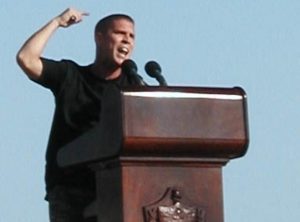
 Cubanet, Luis Cino Alvarez, 15 March 2017 – At the beginning of the last decade, when Fidel Castro would call a “march of the fighting people” for any reason whatsoever and the multitudes who seemed to have arrived from Pyongyang would chant slogans and wave little paper flags, prominent for his impetuous verbiage was a young man called Hassan Perez Casabona.
Cubanet, Luis Cino Alvarez, 15 March 2017 – At the beginning of the last decade, when Fidel Castro would call a “march of the fighting people” for any reason whatsoever and the multitudes who seemed to have arrived from Pyongyang would chant slogans and wave little paper flags, prominent for his impetuous verbiage was a young man called Hassan Perez Casabona.
Gesticulating like a dervish, with a crew cut, camouflage trousers, and huge Russian military boots that seemed suitable for kicking any dissenters, Hassan Perez, who at that time was the second secretary of the Union of Young Communists (UJC), was the most Taliban of the Taliban of the so-called Battle of Ideas, Fidel Castro’s personal version of Mao’s cultural revolution. In this “battle,” young men like the bellicose Hassan, indoctrinated to the core and supposedly immune to the corruption, were called to play the role of the Red Guards.
Hassan Perez, who improvised his leftist militant teques* of the barricade with the ease of a Candido Fabré, seemed to have no brake. Nothing contained his quarrelsome and intolerant eloquence. When in 2002, in the Aula Magna of the University of Havana, the former American president Jimmy Carter referred to the Varela Project, quickly and aggressively Hassan Pérez requested the floor to refute him, in the presence of the Maximum Leader, who observed him pleased, although ready to stop his jackal if he let his passion run away with him.
With the retirement of Fidel Castro in July 2006, the Battle of Ideas was fading away, and the Taliban, who with their supra-institutional nonsense represented a nuisance to the succession and the Raul regime reformers, were removed from the scene.
In 2008, in an extraordinary meeting, the National Communist Youth Bureau agreed to work with Hassan Pérez and send him as a professor to a university of the Revolutionary Armed Forces. Although they acknowledged his work as a youth leader, first in the Federation of Middle School Students (FEEM) and later with the University Student Federation (FEU) and Communist Youth, this was interpreted as a setback. Especially given that, shortly before, at the Fifth Congress of the UJC, he had not been elect, as expected, first secretary of the organization.
From that point Hassan Perez lectured in full military uniform – which must have been to his liking, in view of his fondness for military attire – as a lieutenant, in the classrooms of the Military Technical Institute (ITM) teaching history classes.
For almost eleven years there was no mention of Hassan Perez. He only saw himself on TV, dressed in uniform and in his delegate’s chair, during a meeting of the National Assembly of People’s Power, where he voted unanimously in favor of everything that was put before him.
But now, the entrenchment of immobile orthodoxy is generating a neo-Stalinist reflux that has once again brought Hassan Perez to the fore. He is now an assistant professor at the Center for Hemispheric Studies and the United States at the University of Havana and his extensive and bizarre articles appear in the official press.
It seems that Castro’s monks do not have too many better options to choose from if they have had to dust off and get to grips with the annoying Hassan Perez. In short, if it is a question of becoming intolerant and frightening in the discourse toward the sheep who want to go astray, the boy does the job well. And in the years that he spent in professorial penance he is assumed to have overcome the immaturity that he was previously reproached for.
*Translator’s note: (Source: Conflict and Change in Cuba, Baloyra and Morris) “El teque is Cuban slang for the unrefrained barrage of official rhetoric that emanates from the state. I is the old, the formal, the staid, that which has become meaningless through repetition. El Teque is the officialese, the discourse of a revolution that is no longer revolutionary.”
